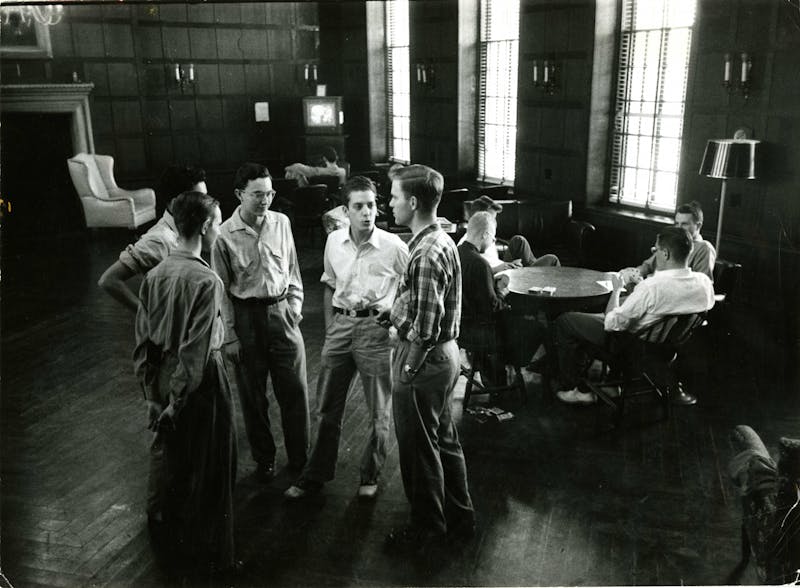
COURTESY OF THE UNIVERSITY ARCHIVES — SHERIDAN LIBRARIES
Students discuss among themselves in AMR I circa the 1950s, around the time Baensch wrote for The News-Letter.

COURTESY OF THE UNIVERSITY ARCHIVES — SHERIDAN LIBRARIES
Students discuss among themselves in AMR I circa the 1950s, around the time Baensch wrote for The News-Letter.
The News-Letter had a very different and more important role during my years, 1953 to 1957, on the Homewood Campus.
There were no iPhones to provide immediate communication anytime and anywhere. There was only the black payphone hanging on the wall at the end of the hall in the dormitory.
There were no laptop computers to link into the immediate network of communications and wide range of information. There were only typewriters clacking away into the night. There was a midnight curfew on the use of typewriters in the dormitory.
The News-Letter provided the Homewood student with news, information and a form of community membership. Few of us read the Baltimore Sun. The News-Letter served as a cross-cultural bridge for the two major worlds of the liberal arts students and the pre-med intense science students. There were articles about the key faculty achievements, such as George Boas in philosophy, or Hiram Bentley Glass in the biological sciences or William H. McClain in German literature. These articles provided an understanding of the role of the faculty and the University beyond lecture halls, classes and laboratories. There was coverage for the pipe-smoking contest — and who today still smokes a pipe?
The News-Letter introduced the new and fast sport of lacrosse to those of us who knew only the traditional sports of football and basketball. University sports were not widely broadcast in those early days of TV. The Baltimore Sun only reported on the final champion games — so the photos and stories in The News-Letter provided tangible evidence of the champion Hopkins lacrosse teams and individual student players.
There were articles about venturing downtown to the Inner Harbor’s waterfront nightlife jazz bars (not the safe area it is now), about the cultural values of the Baltimore Museum of Art and the Walters Art Museum and the George Peabody Library. The academic programs of Hopkins were so intense and demanding that The News-Letter staff made many efforts to introduce students to life beyond the Homewood Campus.
Especially the freshman-year students would recognize The News-Letter as providing tangible reporting about their new university community. Here was timely information about what was happening, what was directly relevant to each in their new and challenging environment. There was no internet, no iPhone to communicate or connect with. The News-Letter was created by students and for students at a time when there were no other meaningful or relevant sources.